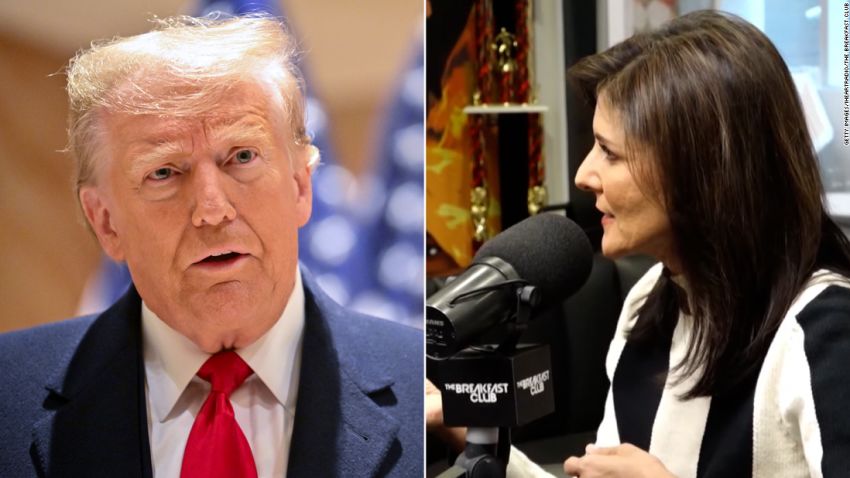Editor’s Note: Julian Zelizer, a CNN political analyst, is a professor of history and public affairs at Princeton University. He is the author and editor of 25 books, including The New York Times bestseller “Myth America: Historians Take on the Biggest Lies and Legends About Our Past” (Basic Books). The views expressed in this commentary are his own. View more opinion on CNN.
Republican presidential candidate Nikki Haley is finally unleashing on her opponent, former President Donald Trump. Although she spent much of her time during the Iowa caucuses and New Hampshire primary focused on Florida Gov. Ron DeSantis, generally avoiding being very tough with the former president or going so far as to defend him during his legal problems, now she has changed her tone.
In a pre-taped interview with Charlamagne tha God on “The Breakfast Club” that aired Wednesday morning, Haley lit into Trump without much restraint, calling him “toxic” and saying that he lacked “moral clarity.” He “broke” things and divided people, she said.
Haley has unveiled a series of video ads mocking President Joe Biden and Trump, calling them “grumpy old men.” She questioned Trump’s mental condition for the first time last month, stirring concerns about mistakes and misstatements that he has been making on the campaign trail — not under the guise of spreading disinformation but because, she maintained, he is too old to handle this job. When Trump appeared to confuse her with former House Speaker Nancy Pelosi during a speech about January 6, Haley jumped at the opportunity to criticize him.
“The concern I have is,” she said, “I’m not saying anything derogatory, but when you’re dealing with the pressures of a presidency, we can’t have someone else that we question whether they’re mentally fit to do so.” According to Haley, Trump is too busy raising money to pay for his ballooning legal expenses to focus attention on the campaign. She has been warning conservative donors that Trump’s nomination could easily cost the GOP control of the House.
We don’t know for sure why Haley has decided that the time has finally come to directly take on the former president and avoid the sort of milquetoast statements that had thus far characterized her campaign rhetoric.
Obviously, the fact that Gov. DeSantis and all the other Republicans have dropped out of the competition fundamentally changed the nature of the game. No longer having to compete to win over the “anti-Trump” vote, which she now owns, the former ambassador can turn all of her attention and firepower in a different direction.
Haley must also realize that the risk of angering Trump voters has become less pertinent than the potential gain from solidifying and energizing those in the party who want a different choice. Under current conditions, Haley needs support from those factions of donors and voters who can sustain her run as long as possible, perhaps anticipating the potential for a legal conviction to render his candidacy untenable.
With this mindset, the goal is not to defeat Trump in the next few rounds of competition, but to remain credible enough with those who dislike him to survive for another day. The only way to do this is to distinguish what she offers from what Trump has promised — avoiding the trap DeSantis fell into of thinking that being “Trump-lite” could have appeal when the real Trump was already on the ballot.
After watching Trump, as well as her Tea Party colleagues, Haley has seen how provocative and controversial statements, along with smash mouth attacks, are the best way to keep the eyes of the press upon her. Questioning Trump’s mental dexterity is literally taking a page out of her opponent’s playbook.
Some of her switch in tone is also a sign of sheer desperation. Despite all of her optimism, she and her team understand that the odds of her winning are extraordinarily low. She lost in the one state — New Hampshire — where she stood the likeliest chance of winning, and Trump performed as well as he needed to in order to demonstrate that his support among primary voters is solid. Polls show her trailing Trump in a number of states. Her only hope is to develop an effective and blistering line of attack that devastates Trump’s brand value.
But, if the latest Washington Post-Monmouth University poll is any indicator, the new tactic is coming quite late. The poll ahead of the February 24 South Carolina primary shows Trump holds a sizeable 26-point lead over Haley in the state.
Trump, who probably sensed that the his criminal trials offered a platform to advance his narrative about being the true anti-establishment figure and who figured out, through his appearances in the courtroom and refusal to debate the other Republican candidates, how to dominate the media stage, has solidified his position among those who are coming out to vote. He has also successfully sold a narrative about himself.
Rather than being a one-term president who cost his party power on Capitol Hill and faces unprecedented legal charges (he denies all wrongdoing), Trump has used the last few months to falsely sell himself to Republican voters as a victim: he is the victim of a stolen election, he is the victim of a president out to get his opponent, he is even a victim of a Republican establishment desperate to bring him down so that they can protect Wall Street and war making.
While it doesn’t take much research to demonstrate how this entire story doesn’t fit the facts, the storyline appears to be setting in for much of the red electorate, to the point it is difficult for Haley to undo. In presidential campaigns, perceptions can set in quickly and become hard to shake. Indeed, though it is not impossible to believe that his confusing Haley and Pelosi was in fact intentional — an effort to confuse voters in suggesting that the very conservative Haley is actually a Democrat in Republican clothing.
The odds are low that Haley’s attacks will do much to significantly change Trump’s narrative.
Haley’s best bet is that by ramping up the intensity of her attacks, she can remain in the political game. Donors who dislike Trump will keep funding her. Voters in primary states who hate Trump and like her will give her enough of a vote to remain relevant. And then, the biggest question of all is whether an opening for Haley would develop if Trump gets convicted in one of the four criminal cases pending against him and, (as some polls suggest) suffers a loss of support.







